The path to an entrepreneurial future
Donors, sponsors, mentors help make Dianne and M. Edward Rister ’74 Agribusiness Entrepreneurship Program unique
The Dianne and M. Edward Rister ’74 Agribusiness Entrepreneurship Program in Texas A&M’s College of Agriculture and Life Sciences gives students real-world business knowledge to help them find their path as entrepreneurs or business leaders. And now a recent chair endowment, established by Kathi and Murray Edwards ’73 and Shirley and Joe Swinbank ’74, is helping ensure that path leads to success.
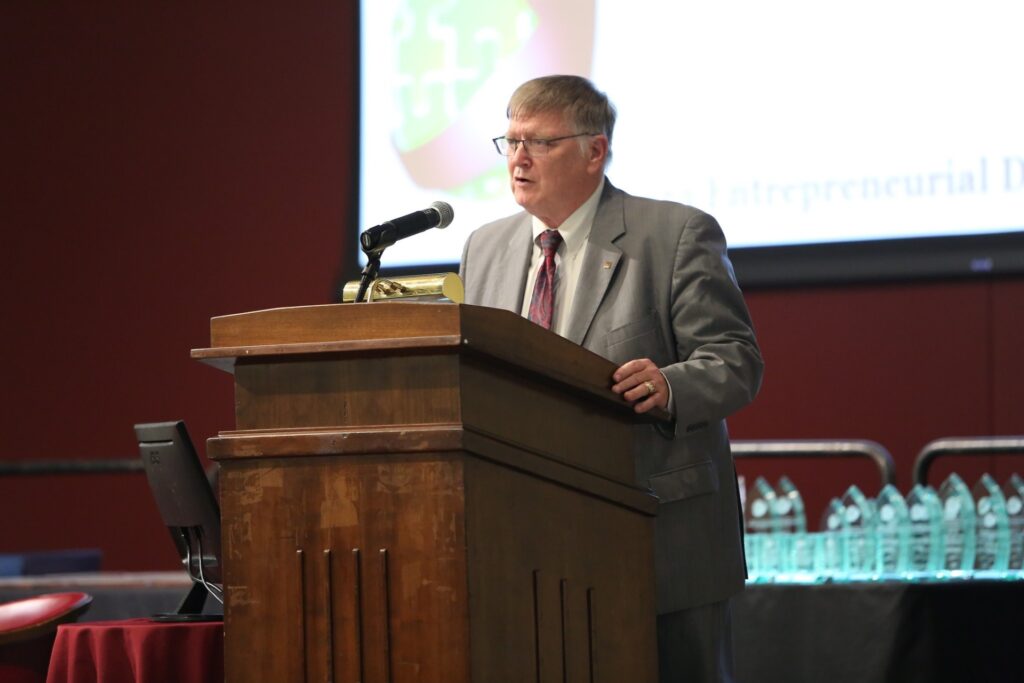
The program uniquely equips and positions students in the Department of Agricultural Economics to move their entrepreneurial ideas forward by developing successful business plans and models. Students who may not have a business idea of their own can still learn how to evaluate businesses in preparation to become a lender, business manager or administrator.
“Our goal is to prepare students with the analytical and communication skills needed to accurately assess and discuss the feasibility of a business,” said Ed Rister, Ph.D., professor and holder of the program’s new Dianne and M. Edward Rister ’74 Endowed Chair in Agribusiness Entrepreneurship. Rister is also the director of the agribusiness entrepreneurship program that bears his and his wife’s names.
Rister, who recently received the Agricultural and Applied Economics Association’s national award in teaching during the organization’s annual Conference in Washington, D.C., said the program provides students with real-world, hands-on opportunities to develop economic and financial numerical evaluations of their business ideas.
“And thanks to some very generous philanthropic support, we can also offer a variety of extracurricular, outside-the-classroom activities to supplement the course curriculum, providing transformational learning experiences for our students,” he said.
About the agribusiness entrepreneurship program
During the program, each student evaluates a business enterprise. Some students analyze an enterprise following a case study model, while others analyze an enterprise of their own choosing, kindling their entrepreneurial interests and understanding the process of preparing a comprehensive numerical and qualitative evaluation of an idea.
In the two-semester capstone experience, students develop actual business plans and conduct economic and financial analyses in conjunction with a series of mentoring interactions with “real-world” professionals.
“Dr. Rister essentially established the program on agribusiness entrepreneurship more than 35 years ago and now serves as the program’s endowed chair,” said Rudy Nayga, Ph.D., head of the Department of Agricultural Economics. “He and his wife, Dianne, have developed lasting relationships with the program’s students over the years, both in and out of the classroom. It was only fitting to name the chair after both of them and make Ed the first person to hold that position. Having an endowed chair is important to the program because it will help us continue to find the best and most qualified experts to lead this program in the future.”
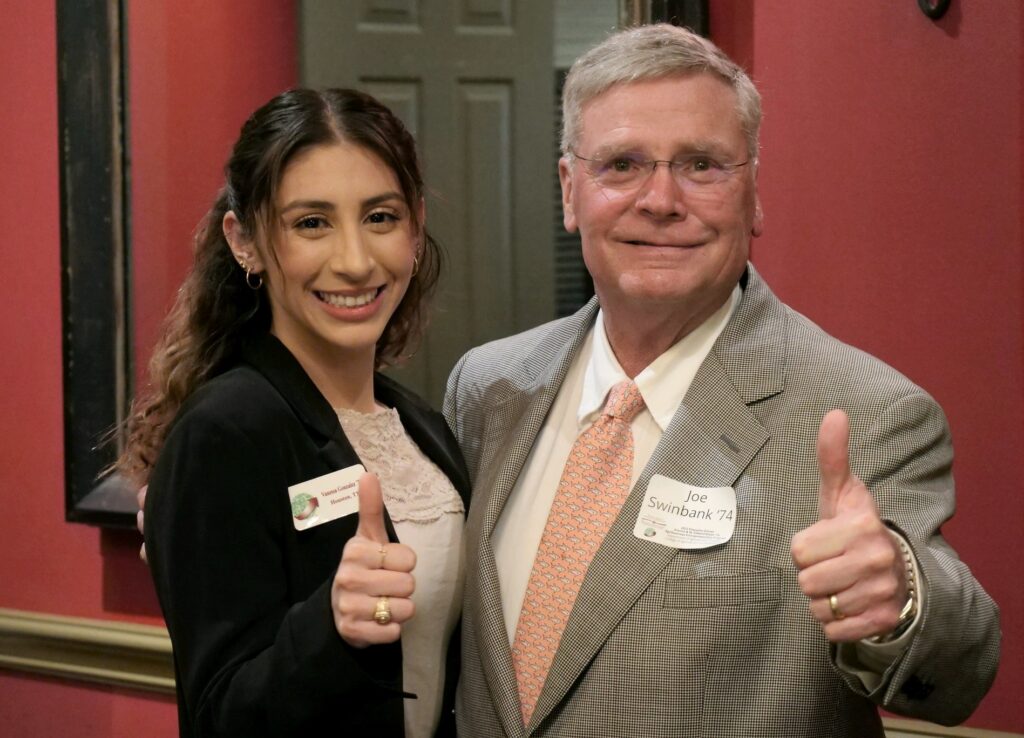
Brandy Kines, director of development for the Texas A&M Foundation, College of Agriculture and Life Sciences, said momentum has been building toward funding the $10 million goal for the endowment and ongoing program support.
“We can’t overstate the importance of our donors in supporting the chair and the program,” Kines said. “They are passionate about this program’s impact on students and how it prepares them for life in the real business world.”
Kines said Rister and his team have developed a network of former students and entrepreneurial professionals who are deeply involved in the program as mentors.
“These individuals’ contributions to both current and former students have intensified their awareness of the program’s impact, fueling their interest in supporting it in the future,” she said.
Mentorship and ‘pitching’
The value of the program is amplified through the interactions students have with numerous successful entrepreneurs and other business leaders and professionals via its flagship events each semester.
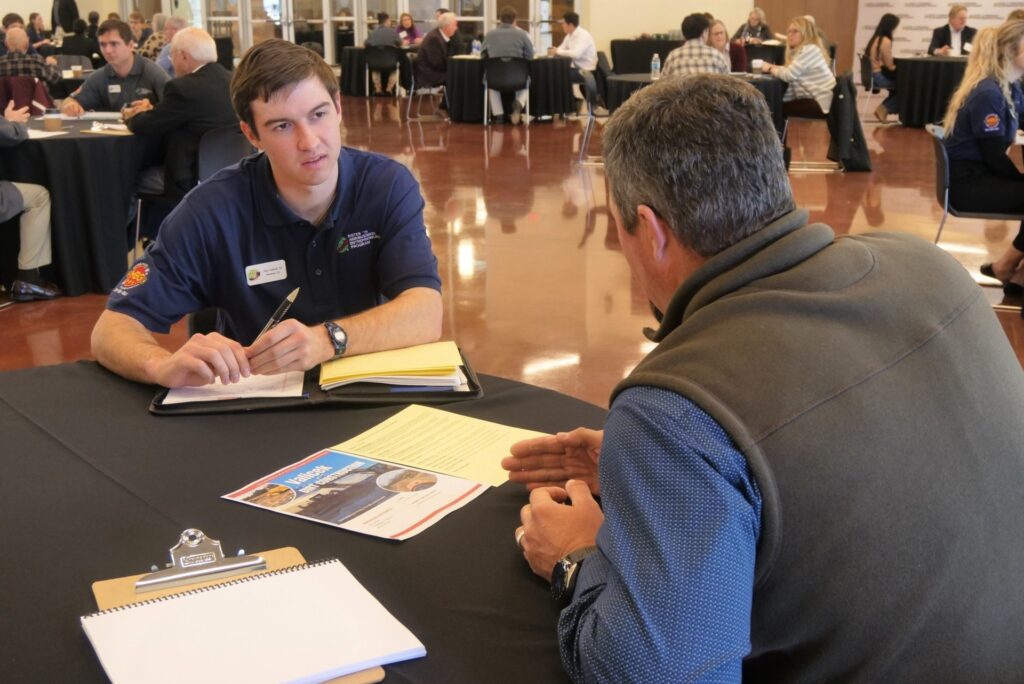
Each fall and spring, mentors participate in the Kathi and Murray Edwards ’73 Agribusiness Entrepreneurship Mentoring Forum, which is held virtually as well as in person on the Texas A&M campus. Students in the AGEC 425 course pitch and receive feedback on their business ideas and plans for implementation from mentors who are entrepreneurs and business leaders. Many of these mentors have been involved in the program since its inception, with others joining the network each year.
During spring, students in AGEC 425 meet with professional business pitch coach Chris Westfall of Westfall and Associates in both collective class settings and individual coaching sessions. The capstone characteristics of the classes allow students to relate their other coursework to pragmatic applications in their own entrepreneurial pursuits.
“Students who complete the program will obtain the business, economics, communication and leadership skills they need to impact their communities,” Rister said. They can use these skills to create jobs, support their community’s infrastructure and be key leaders in their professional industries.”
Later in the semester, students can put their skills to the test and compete in the Texas Farm Credit Entrepreneurial Dreams Symposium.
“In this competition, which consists of three levels, students present their business venture projects to more than 100 entrepreneurs and business professionals,” Rister said. “Top competitors receive awards and thousands of dollars in scholarships are given out, thanks to the generous support of program sponsors and donors.”
Professor-for-a-Day program
Another important facet of the program involves bringing students together with innovative and inspiring people who visit the university and serve as “Professor-for-a-Day.”
“We have strong relationships with some of the most successful innovators, entrepreneurs and businesspeople in the world,” Rister said. “Our professional network is comprised of former students, donors and friends of the program. This network extends across Texas and beyond.”
Rister said these experts give students the benefit of their own experience by sharing some of the lessons they have learned through their successes and failures while building their own enterprise.
Long-term program partners who have spoken in the fall semester include Jim Pillans, former business owner and director of the local Small Business Development Center, Lorenzo Gomez III, serial entrepreneur and author from San Antonio, Rachel Cutrer, serial entrepreneur and publisher of Ranch House Designs from Wharton, and Mark Miller, CEO, Texas Farm Credit.
“Donor-sponsored dinners following these class lectures provide students an opportunity each week to have more intimate conversations with the experts, further kindling the students’ entrepreneurial spirits,” Rister said.
Turning business dreams into reality
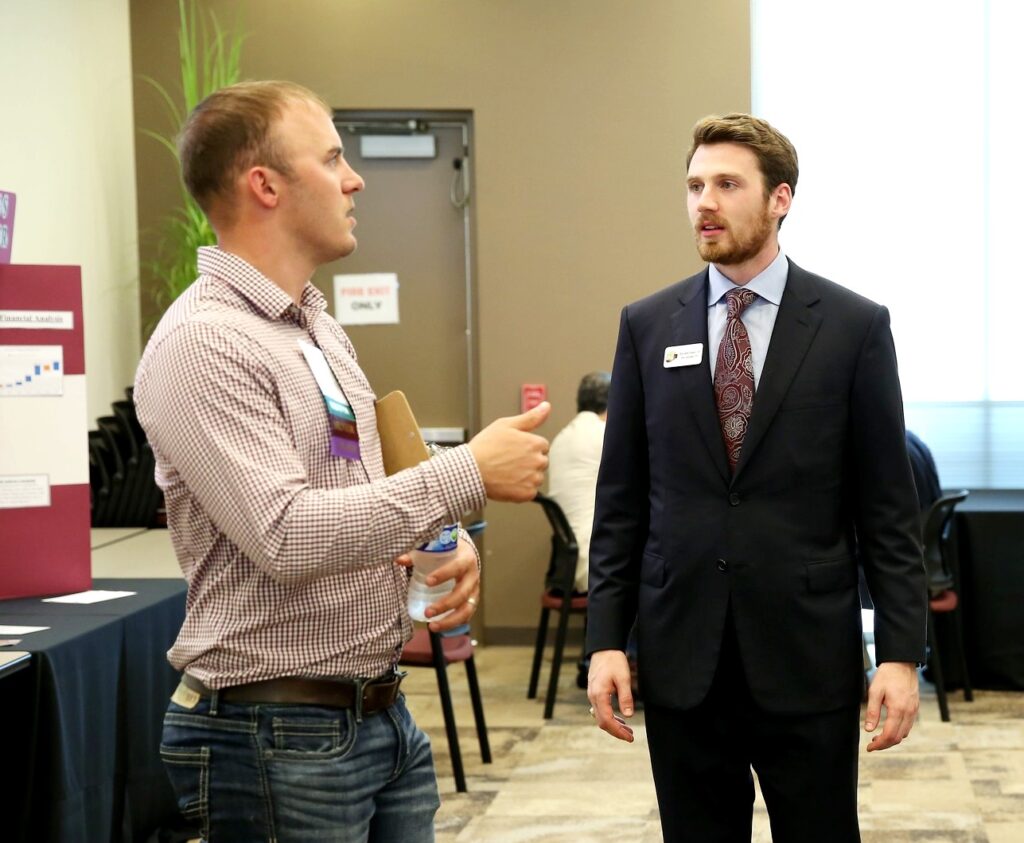
An example of the program’s impact can be found in Ryan Drapela ’19, who graduated from Texas A&M with a degree in agricultural economics with an entrepreneurship focus. He now owns and manages Drapela Works, a woodworking enterprise in El Campo, and another recently acquired business, Frio Coolers.
During college, Drapela transitioned his hobby woodworking business into a full-fledged business. He was named the 2019 AGEC 425 Rural Entrepreneur of the Year in the Rister ’74 Agribusiness Entrepreneurship Program.
After graduating from Texas A&M, he continued to grow Drapela Works, surpassing more than $1 million in sales in 2020. In 2022, he was honored as a new — and the youngest — member of the Aggie 100, a prestigious network of Aggie entrepreneurs.
Drapela said it was the donor-supported flagship events offered through the Agribusiness Entrepreneurship Program that made it unique among such programs.
“These events allowed me to meet, have dinner and hold conversations with successful businesspeople, which provided valuable insights into what it takes to run a business,” he said. “I was able to connect with them on a human level, and that made me realize that I, too, could be an entrepreneur and grow my own business.”
He also attributed many of the “soft skills” he learned, and said were necessary for success in business, to the program.
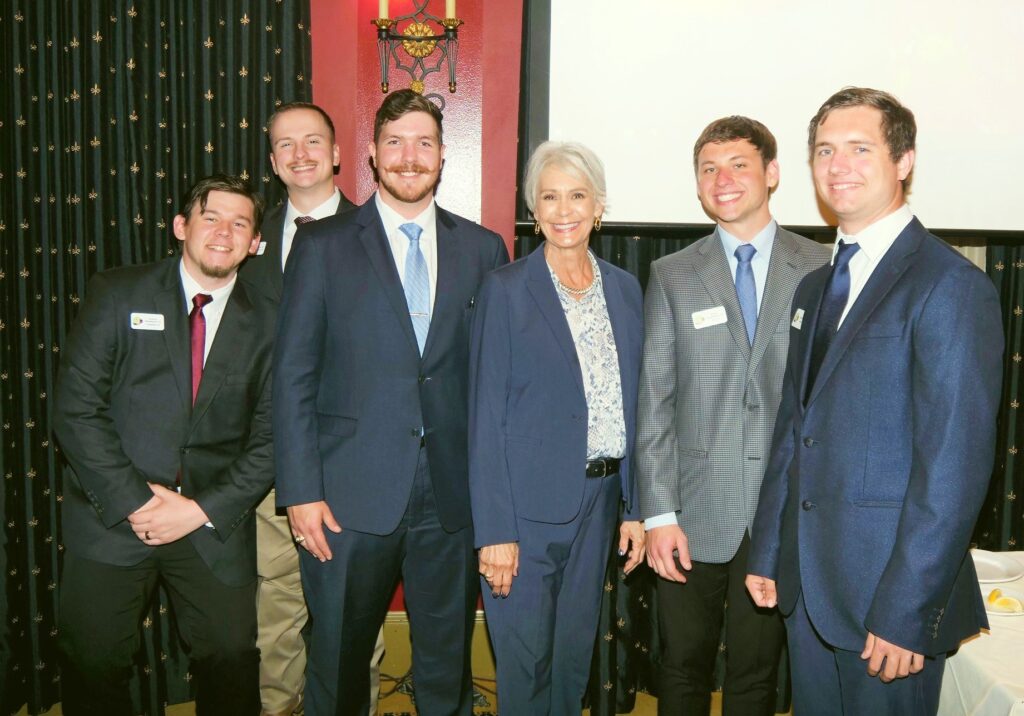
“I learned a lot about business etiquette, how to dress professionally and what topics l should address or avoid when speaking to businesspeople,” he said. “This really helped build my confidence and showed me how to best present myself.”
Drapela credited Rister and Merritt Weeks, assistant director of the agribusiness entrepreneurship program, with supporting him throughout the program. He also expressed his gratitude to Keith Schumann, Ph.D., vice president – quantitative analysis, AgriLogic Consulting, LLC in College Station, for helping him identify his goals and set his priorities.
Additionally, he singled out Randi Mays-Knapp, certified etiquette and leadership coach who partners with the program, for helping him hone his conversational skills.
Entrepreneurship program partners
The Rister ’74 Agribusiness Entrepreneurship Program directly benefits from the investment of time, expertise and philanthropic support from its numerous mentors and program partners. Without the sustained financial support of partners with both pass-through and endowed gifts, the program would be restricted to a classroom-based course, with limited opportunities to provide “real-world” engagement and application.
“Three out of four dollars invested in the program come from private philanthropic support,” Weeks said. “These charitable donations provide operational support for all of the beyond-the-classroom, transformational learning experiences.”
The program’s capstone course experiences conclude with a two-day business pitch competition during the annual Entrepreneurial Dreams Symposium, for which Texas Farm Credit of Robstown is the lead title sponsor. Donors often contribute more than $40,000 in scholarships to be awarded at the close of the symposium, along with providing additional general program support.
With the philanthropic support they have garnered, the program can expand its scale and scope. An endowment campaign was launched in 2019 to establish a chair and endow the program in its entirety in perpetuity. In 2022, the Dianne and M. Edward Rister ’74 Endowed Chair in Agribusiness Entrepreneurship was created. Key leaders who stepped in to participate in advancing the endowment when it was first created include Deborah Treece, Leslie Callahan, Kalyn and Chase Carroll, Cara and Jim Collins, Kathi and Murray Edwards, Dan Haile, Jennings Steen and Shirley and Joe Swinbank.
“I am humbled that so many people invest in creating a rigorous and pivotal entrepreneurial educational experience,” said Rister. “The foundation of this program is based upon competent entrepreneurs and business leaders who give generously of their time, expertise, and personal and business finances.
He said while the program may carry his and his wife’s name, it is the result of a collective effort — and he is thankful for everyone involved.
“This includes the students who continue to impress all of us with their commitment to excellence and life-long learning,” he said. “Their efforts and achievements, while at Texas A&M and following their graduation, fuel the program’s continual growth.”


